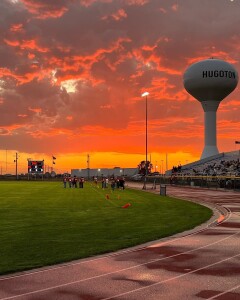Hank Staples, at 94 years old, is a World War II Veteran.
After World War II broke out, Hank, along with his kid brother and a neighbor boy, went down February 4, 1942 to join the Navy.
Hank’s kid brother asked for flying duties in Naval planes during basic training. The brother was declared Missing in Action in later years and Hank never saw him again. Hank had an older brother who was in the Army. Luckily, that brother came home after serving during the war.
They did basic training at Great Lakes Naval Base. During basic training, volunteers were requested for submarine duty. Hank had stated there were two things he would never do while in the Navy: get tatooed and get in a submarine. He learned he should never say “never” because he ended up doing both. He volunteered for submarine duty after all.
The Navy also asked if anyone would like to be trained to be a radioman. Hank thought this would be an easy job, so he volunteered for this assignment.
The first thing he had to do was learn Morse Code. He remarked he did not know what he was getting into, as he was only a farm boy all his life. After he learned Morse Code, he then had to learn to put the code in with a typewriter. He had never even touched a typewriter before. Hank thought he would go nuts before he could learn this job, but finally it just came together in his mind.
The submarine was tight quarters, but he didn’t get claustrophobic. He did much of his duties in the South Pacific in the USS Baloe. Some depth charges shook up the submarine he was in throughout the war but none of them did any damage. Some of the depth charges aimed at their submarine were ‘friendly fire.’ These charges were dropped accidentally by what Hank called “Hotshot Pilots.”
Hank was in Tokyo Bay aboard the USS Runner when the Japanese surrendered aboard the battleship USS Missouri. He could not actually see the USS Missouri because he was too far away, but he was in the same area. The Japanese signed their surrender September 2, 1945.
Mr. Staples remembers George H.W. Bush, father of George W. Bush, was shot down September 2, 1944 – exactly the same date, only the year before. Bush was rescued by one of the U.S. submarines, the USS Finback.
While on the USS Runner, Hank’s submarine had the job of spotting mines. The sub had to go really slow to locate the mines. Hank was operating the sonar to spot the mines at night. During the daylight hours, his crew would send and receive messages while on the water’s surface.
While he was in the Navy, Hank was able to see a lot of different countries. His submarine went through the Panama Canal. He was able to see New Guinea, Solomon Islands, Marshall Islands, Guam, Hawaii and Midway. However, they did not have enough time to see many of the sights. When Hank was stationed in Hawaii, they experienced blackouts every night.
He also went to the east coast of Australia. He thought he would like to go back to that country someday. Australia at that time was quite far behind the United States, using nearly antique appliances like 25-year-old refrigerators, etc.
Hank rode the train while he was stationed there. The Australian trains were about like American trains in the 1800s. The U.S. sailors were in their dress whites and they were spotless when they boarded. By the time they got off, though, they were covered with black soot. Hank stated the east coast of Australia was wide open at that time. Thank goodness, the Japanese did not attack there during that time, as there was no protection for the coast.
Once, their submarine ran through a terrible storm. It was such a rough storm, they couldn’t rig out the bow planes to dive. The heavy waves smashed some of the structure on top of the submarine. This was the worst damage inflicted on the sub during his time served.
Hank saw a lot of entertainment acts while in the service. He got to see the world heavyweight champion boxer, Gene Tunney. He saw Bob Hope perform at the USO although he could not get very close to him.
A sailor’s wages in Hank’s time were $21 a month. This was not very much but it was still enough so they could go to the USO while stationed in New York and purchase any show in town. He was able to see the Radio City Music Hall Rockettes. He attended a boxing match at Saint Nicholas Arena which is not in business any more. He was able to attend the Saturday Night Hit Parade and he went to the Waldorf Astoria as well as Staten Island. He was offered New York Yankees game tickets but he refused them as it wasn’t the team he liked. He felt the servicemen were treated good while they were in the service.
Hank was discharged in October of 1945. He served a total of three years, eight months and two weeks.
Hank was born at Pratt, and raised south of Plains. He farmed for about three years and couldn’t make a living. He finally got a job with Northern Natural Gas Company and was eventually transferred to Hugoton. He worked here until his retirement.
He commented he would not take a million dollars for all his memories of the Navy, but he would not want to go through that experience ever again.
Thank you Mr. Staples for your service to our country.



